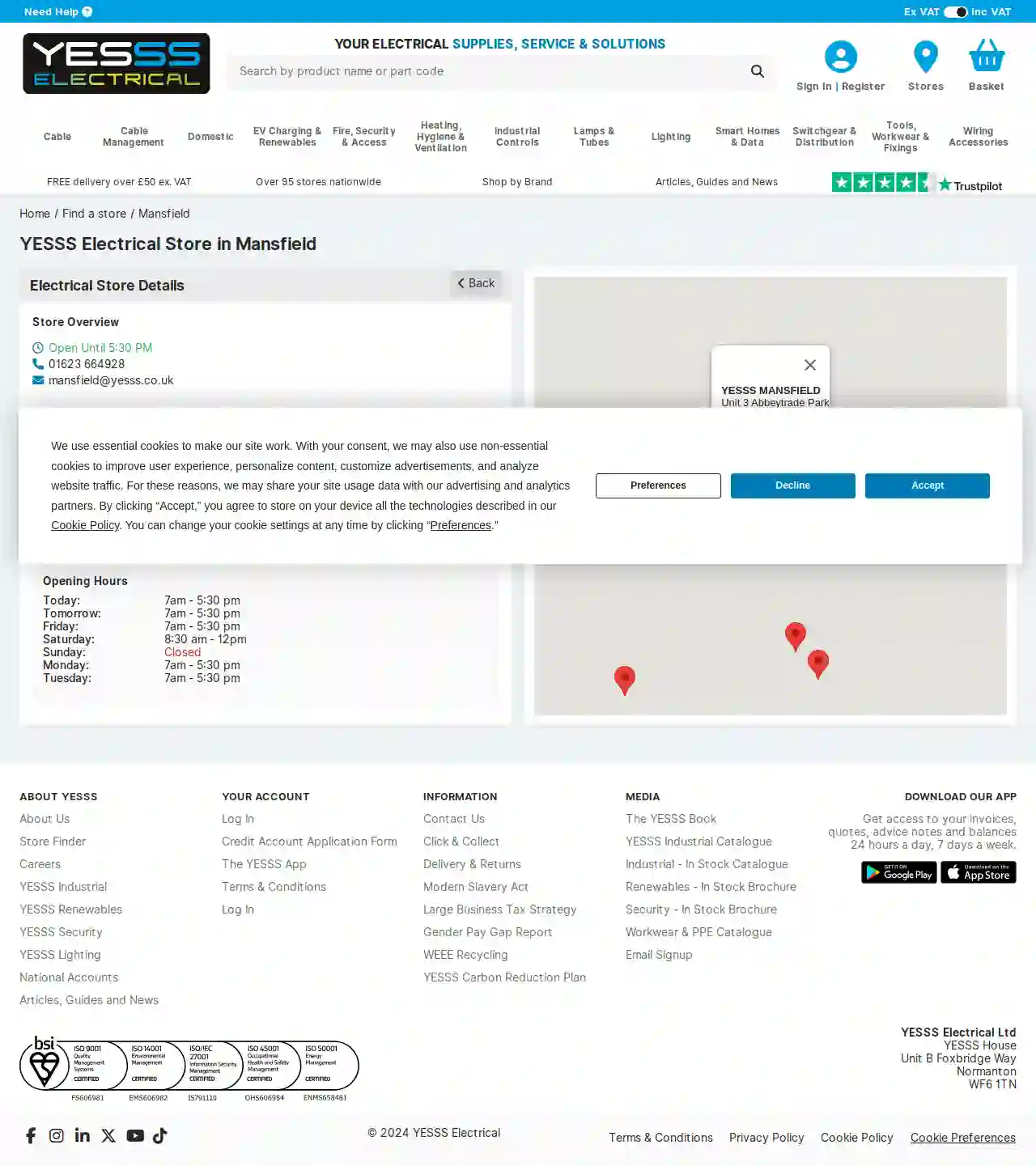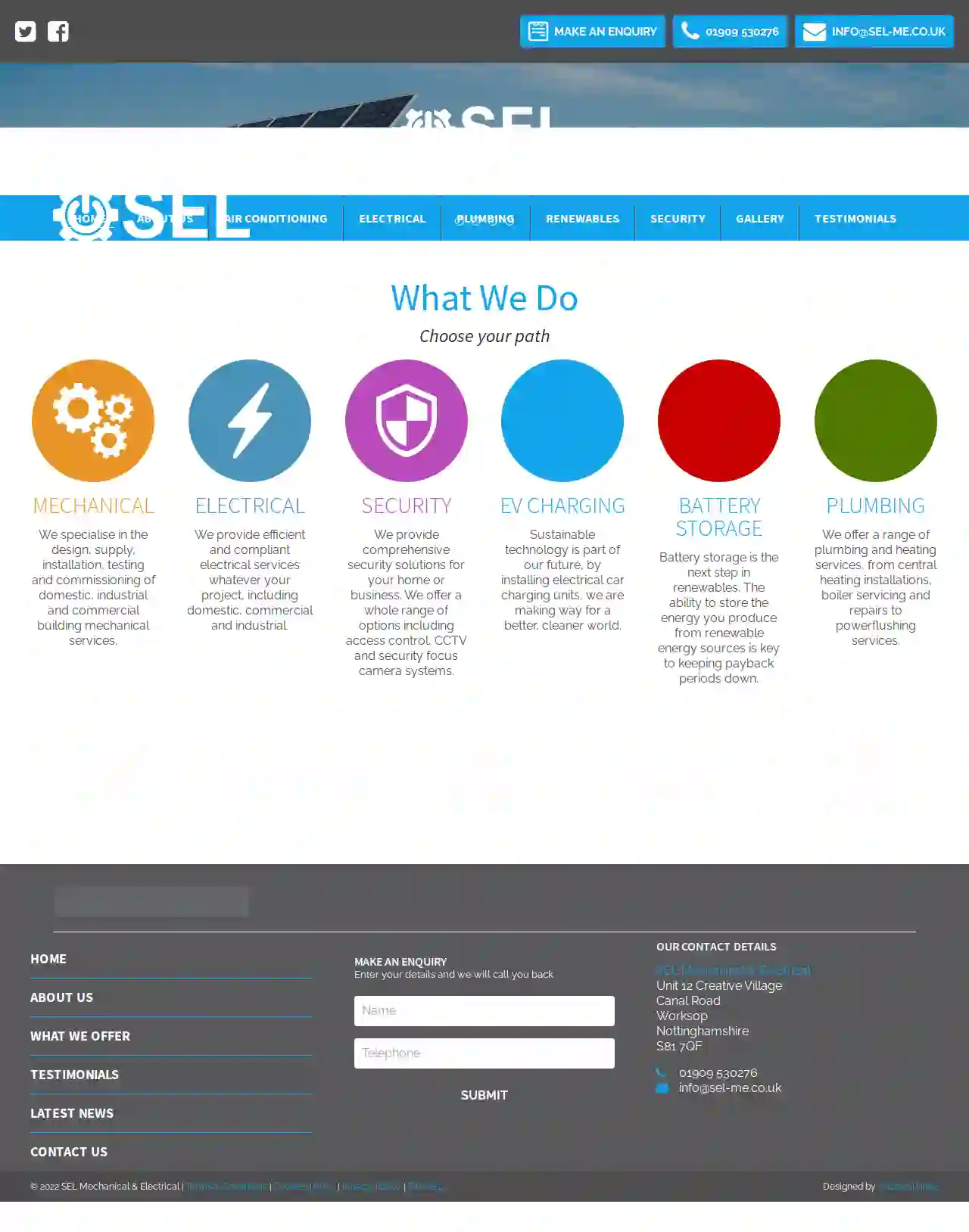Solar Installers Rainworth
Find top Solar Panel Installers in Rainworth
Receive 3 FREE Solar Energy Company quotes for your project today! Compare profiles, reviews, accreditations, portfolio, etc... and choose the best offer.

Cannon Solar
55 reviewsWorksop, GBCannon Solar, the foremost MCS accredited solar panel contractor in the UK, takes pride in delivering professional and high-quality services. Whether you're a homeowner, estate agent, business owner, local authority, or home builder, our expertise spans domestic, commercial, and industrial solar electric installations. With a focus on renewable energy, we specialise in the seamless integration of Solar Panels. Our clients value our professionalism, extensive experience, high quality, and cost-effective solutions.
- Services
- Why Us?
- Gallery
Get Quote
Eco Solar Homes
43 Blenheim Rise, Worksop, S81 7NE, GBEco Solar Homes, based in Worksop, are your local experts in renewable energy solutions for both homes and businesses. With over 15 years of experience in the industry, they offer a range of services including Solar PV, Battery Storage, EV Chargers, and Air Source Heat Pumps. Their team of fully accredited electrical engineers is committed to delivering high-quality products and services that exceed customer expectations. Eco Solar Homes prides itself on its industry expertise and use of market-leading renewable energy products. They work with clients throughout the UK, providing tailored solutions to meet individual needs.
- Services
- Why Us?
- Gallery
Get Quote
Get Solar PV
Cleethorpes, England, 36 High Street, DN35 8JN, GBGet Solar PV is a company that helps homeowners and businesses switch to solar energy. They provide a quote tool that determines the customer's requirements and connects them with trusted suppliers. The company ensures that all installers are fully compliant with UK legislation and best practice industry procedures. They also offer flexible payment plans and finance facilities. Get Solar PV is a responsible agent that prioritizes the environment and customer satisfaction.
- Services
- Why Us?
- Accreditations
- Our Team
- Testimonials
- Gallery
Get Quote
Renewafuel Home Innovations
4.735 reviewsWorksop, GBRenewafuel is a leading provider of renewable energy solutions, helping homeowners and businesses transition to a cleaner, greener future. We offer a wide range of services, including solar panel installation, battery storage, air source heat pumps, and EV charging. Our team of expert engineers is dedicated to providing high-quality, reliable solutions tailored to your individual needs. We are committed to delivering exceptional customer service and ensuring your complete satisfaction. With our expertise and commitment to sustainability, Renewafuel is your trusted partner for all your renewable energy needs.
- Services
- Why Us?
- Accreditations
- Our Team
- Testimonials
- Gallery
Get Quote
YESSS Electrical Mansfield
44 reviewsNormanton, Unit B Foxbridge Way, WF6 1TN, GBYESSS Electrical is a leading electrical wholesaler providing technical assistance with industrial products and services. With over 10,000 products sourced from the UK's leading electrical brands, we offer competitive prices and all the electrical supplies you'll ever need regardless of your project or budget. Our fleet provides next day delivery to our local stores, offering you fast and flexible delivery options to suit your business or lifestyle. With over 95 stores nationwide open to both trade and public customers, we are the fastest growing electrical wholesaler in the country and the first stop for all your electrical supplies, services and solutions.
- Services
- Why Us?
- Accreditations
- Gallery
Get Quote
Danlec Solar & EV Chargers
4.9374 reviewsUnit 4, Shireoaks Network Centre, Coach Crescent, Worksop, S81 8AD, GBProviding homes and businesses with Energy Saving Electrical, EV Charging and Solar Energy Systems. Our NICEIC Approved team of qualified electricians are here to provide professional and courteous services from a consumer unit upgrade to a full factory re-fit. We are ready to help you upgrade, refurbish, or repair any electrical issue in your home or business. With our specialist EV charging installers and technical support team, we are on hand to help you choose the perfect EV charger for your home or business. Our 5 Year Workmanship Guarantee and Trustmark Certification are both included with every installation for your total peace of mind. Choose from our bespoke range of solar panels to reduce your energy bills and carbon footprint.
- Services
- Why Us?
- Accreditations
- Testimonials
- Gallery
Get Quote
Smart Energy GB Ltd
Canal Road, Worksop, Unit 12 Creative Village, S81 7QF, GBSEL Mechanical & Electrical is a company that specializes in providing efficient and compliant electrical services, mechanical services, and plumbing services to various clients. With over 30 years of experience in the industry, they pride themselves on delivering high-quality work, on time, and within budget. Their team is knowledgeable and exacting in their standards, and they are always willing to help with all aspects of a project, from design to site meetings. They have a good reputation built over the years and strive to give their clients a great experience.
- Services
- Why Us?
- Testimonials
- Gallery
Get Quote
GB Solar Ltd
559 reviewsUnit 6 Coach Crescent, Shireoaks Network Centre, Worksop, S81 8AD, GBGB Solar is a company that specializes in the installation of domestic and commercial solar panels, including retrofit storage batteries. They serve customers in Yorkshire and the East Midlands, covering areas like Sheffield, Leeds, Nottingham, and surrounding regions. GB Solar prides itself on providing exceptional workmanship and customer care, aiming to help customers save money and reduce their carbon footprint. They emphasize their commitment to customer satisfaction, highlighting positive feedback and five-star reviews on Google.
- Services
- Why Us?
- Gallery
Get Quote
Green Energy Power Solutions
2.133 reviewsWorksop, GBEstablished since 2009, Green Energy Power Solutions are dedicated to sustainable energy and have been effectively helping customers to lower their carbon footprint by switching to renewable energy. With the ever-increasing energy rises, there is no better time than to consider installing solar energy to your home. Our Services Installation - Solar PV System. Prices from £2995 Annual Service Plan £179 Maintenance Visit £125 GET IN TOUCH [email protected] 01909500555
- Services
- Why Us?
- Gallery
Get Quote
B&R Solar Services LTD
548 reviews7 poplar grove, Edwinstowe, NG21 9GP, GBB&R Solar Services Ltd are local electricians based in Mansfield specialising in Domestic, Commercial & Industrial electrical services. We offer a full range of Electric vehicle charging options. As a Renewable energy specialist, we offer a full range of Solar PV & battery installations. We also offer full Fire panel installation & testing services. We carry out work through all of the East Midlands for a variety of clients. We are your local Mansfield based electricians!!!! Our current client Base includes:Mansfield district council, Serco, Wates & Aldi. We also provide services to national known brands like Boxt & Halfords! We take pride in our work and strive for excellence in every project we undertake. Our attention to detail and high standards ensure that our clients receive top-quality workmanship and results that exceed their expectations. If you have any questions regarding the services we offer please reach out to us either by telephone or email. We always try and be as friendly as possible and offer you the best advice. We always try and respond within 1 hour, weekends and holidays could delay our response.
- Services
- Why Us?
- Gallery
Get Quote
Over 3,485+ Solar Installers onboarded
Our solar contractors operate in Rainworth & surroundings!
SolarCompaniesHub has curated and vetted the Best Solar Companies in Rainworth. Find the most reliable pro today.
Frequently Asked Questions About Solar Installers
- Your current energy usage
- The size of your solar system
- Your local electricity rates
- The amount of sunlight your panels receive
- Available net metering policies
- System size (measured in kilowatts, or kW)
- Type of solar panels (monocrystalline, polycrystalline, thin-film)
- Roof complexity (pitch, size, obstructions)
- Labor costs in your area
- Available incentives and rebates
- Keep Panels Clean: Clean panels periodically to remove dirt, debris, and bird droppings, which can reduce efficiency. Rainfall usually cleans panels adequately, but you might need to hose them down occasionally.
- Visual Inspections: Regularly inspect panels for signs of damage, loose wiring, or other issues.
- Professional Maintenance: Consider having a professional solar installer inspect your system every few years to ensure optimal performance.
- Use a Directory Like SolarCompaniesHub: We connect you with pre-screened, qualified solar installers in your area.
- Check Online Reviews: Look for positive reviews on Google, Yelp, and other reputable sources.
- Ask for Referrals: Get recommendations from friends, family, or neighbors who have gone solar.
- Verify Credentials: Ensure the installer is licensed, insured, and certified by reputable organizations (e.g., NABCEP in the US).
- Get Multiple Quotes: Compare quotes from at least 3-4 installers to find the best value for your project.
- Ask Questions: Don't hesitate to ask installers about their experience, warranties, and the process they follow.
How much can I save on my electricity bill with solar panels?
What is the average cost of solar panel installation in UK?
How do I maintain my solar panels?
How do I find a good solar installer near me?
How much can I save on my electricity bill with solar panels?
- Your current energy usage
- The size of your solar system
- Your local electricity rates
- The amount of sunlight your panels receive
- Available net metering policies
What is the average cost of solar panel installation in UK?
- System size (measured in kilowatts, or kW)
- Type of solar panels (monocrystalline, polycrystalline, thin-film)
- Roof complexity (pitch, size, obstructions)
- Labor costs in your area
- Available incentives and rebates
How do I maintain my solar panels?
- Keep Panels Clean: Clean panels periodically to remove dirt, debris, and bird droppings, which can reduce efficiency. Rainfall usually cleans panels adequately, but you might need to hose them down occasionally.
- Visual Inspections: Regularly inspect panels for signs of damage, loose wiring, or other issues.
- Professional Maintenance: Consider having a professional solar installer inspect your system every few years to ensure optimal performance.
How do I find a good solar installer near me?
- Use a Directory Like SolarCompaniesHub: We connect you with pre-screened, qualified solar installers in your area.
- Check Online Reviews: Look for positive reviews on Google, Yelp, and other reputable sources.
- Ask for Referrals: Get recommendations from friends, family, or neighbors who have gone solar.
- Verify Credentials: Ensure the installer is licensed, insured, and certified by reputable organizations (e.g., NABCEP in the US).
- Get Multiple Quotes: Compare quotes from at least 3-4 installers to find the best value for your project.
- Ask Questions: Don't hesitate to ask installers about their experience, warranties, and the process they follow.